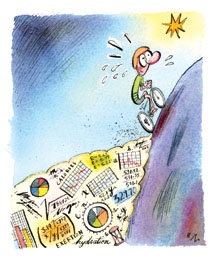
|
October 10, 2007: On the Campus
(Illustration: hal mayforth; Photos: Hyunseok Shim ’08) |
Cycling and soup kitchens
 By
Isia Jasiewicz ’10
By
Isia Jasiewicz ’10
Pedaling hard against the wind on a steep bike course, Nick Frey ’09 depends both on athleticism and on tricks gleaned from his mechanical and aerospace engineering courses.
“Anytime I learn something in engineering, it’s through the lens of cycling,” Frey explained. “I learn something about aerodynamics, and I think about how it applies toward the time trial.”
In July, the Iowa native beat out 140 cyclists aged 19 to 22 to earn a spot at the Espoir World Championship Time Trial Sept. 26–30 in Stuttgart, Germany. In the cycling world, he said, the event is “as big as Tour de France.”
When Frey learned about aerodynamic drag, he worked to reduce his own drag on the bike. “One of the big factors in how much aerodynamic drag you have is your frontal area,” he said. To find a way to minimize that, Frey got on his bike in his basement with a single spotlight facing him, and had his father trace his shadow on a sheet of paper behind him. Frey determined the area of his shadow and then tried adjusting his position to reduce it.
Frey relies on other engineering-inspired tricks as well, like trying to decrease drag by fitting his 6-foot 3-inch frame into a small skin suit (“You can barely pull it off me,” he joked). He also has equipped his bike with a meter that measures his speed, cadence, power, and heart rate, then hooks it up to a computer to download the statistics. “I can zoom in on different parts of the race and see, here I could have been more smooth, or my heart rate spiked because I had a big jump in my power,” he explained.
During the school year, Frey trains by going on four- to five-hour bike rides several times a week, either by himself or with the Princeton Cycling Team, a club sport through which Frey won the jersey for best overall cyclist in the Eastern Collegiate Cycling Conference.
Frey, who has been racing competitively since he was 14, hopes to become
a cycling professional. While his fallback plan is engineering consulting,
for now he wants to “really go for it and see where I can go with
cycling. I love it so much.” ![]()
 By
Folasade John ’09
By
Folasade John ’09
On a Wednesday night inside St. Bartholo-mew’s Church in Trenton, nine members of the Class of 2011 were fixing a pasta dinner. It was Professors’ Night, and the freshmen were preparing to host faculty and community members.
The group was among 110 students who signed up for Community Action, a pre-orientation activity that allowed freshmen to participate in weeklong service projects at one of 12 different sites in Princeton, Trenton, and Philadelphia. In addition to their
service work, the students read Nickel and Dimed by Barbara Ehrenreich, which they would discuss in a precept-like environment during Professors’ Night.
“It’s supposed to get the mental cogs turning in the minds of the freshmen,” said Josh Loehrer ’08, one of three Community Action coordinators. “The students get to talk about what they are living.”
While students like Casey Bogles ’11 said their eyes were opened by the experience, the community members already understood the issues.
“You can’t pay your bills, so you have to decide which bills to pay: ‘Am I gonna eat or am I gonna have electricity?’” said the Rev. Sonja Pancoast, pastor of St. Bartholomew’s.
Ann Orth, of the Trenton Area Soup Kitchen, said local residents she deals with are even worse off. While Ehrenreich wrote about those struggling in their jobs, Orth said, those visiting the soup kitchen search in vain for any kind of job, car, or food.
The issue of food was close to the students in this group: They served meals at the soup kitchen and with Mobile Meals, an organization that brings hot meals to the elderly and disabled who cannot leave their homes to get food.
“You have this power, and you get to use it for good things,” said Edward Freeland *92, associate director of the Woodrow Wilson School’s Survey Research Center.
Freeland was one of 47 administrators and faculty members, including Provost Chris Eisgruber ’83 and professors Stanley Katz and Edward Felten, who participated in Professors’ Night at the various Community Action locations.
“I could brainstorm all night about things we could do,”
Bogles said. “Just make sure you write them all down,” replied
Matthew Lazen, director of studies for Butler College. ![]()
MORE ON THE CAMPUS: “Boot camp” for math; new role for grad students, click here.

To read our exclusively online On the Campus column, click here.
